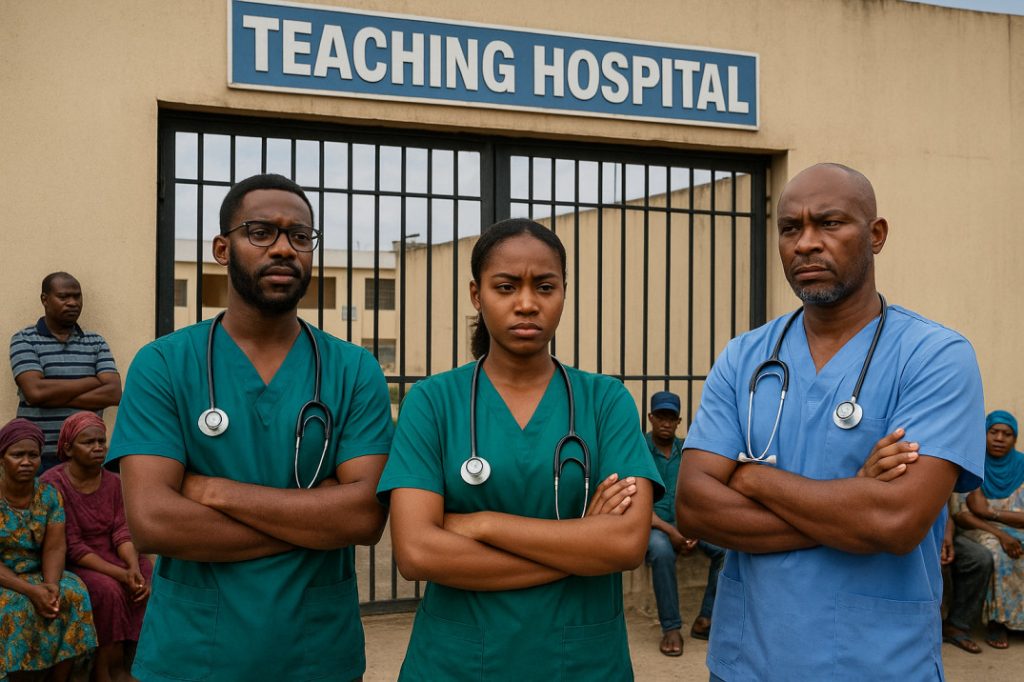A national doctors’ strike is upon us, and (don’t take my word for it) it will be “total, indefinite, and comprehensive.” That’s the language the head of all resident doctors in the country (Dr. Muhammad Usman Suleiman) has repeatedly used to describe the strike slated to commence on November 1, 2025.
Unfortunately, many Nigerians do not understand who resident doctors are or why they are going on strike. This post aims to answer those burning questions and guide you on how best to manage your health in these troubled times.

Who Are Resident Doctors?
They are doctors in postgraduate training to become specialists. These specialty training programs—simply known as “residency”—can last for five years or more.
They are called “residents” because they often live in the hospital.
During residency, the doctors “learn and earn.” They do clinical work, research and study and are paid for their labour. This is what obtains in other health systems like in the USA where residency originated.
How Many Resident Doctors Are in Nigeria?
Nigeria currently has about 11,000 resident doctors. Two out of every five Nigerian doctors is a resident.
Where Do Resident Doctors Work?
Resident doctors form the majority of the medical workforce in teaching hospitals and tertiary health centres—where specialist healthcare is provided and future consultants are trained.
Will the Strike Affect My Hospital?
If your hospital is a teaching hospital or a federal tertiary hospital providing specialized care, yes—it will likely be affected.
However, state general hospitals, private hospitals, and primary healthcare centres may remain open. What is more likely is that these unaffected facilities will become overwhelmed by patients turned away from teaching hospitals.
Why Are the Doctors Going on Strike?
The doctors have made 19 demands to the federal government. These can be grouped under four major headings:
Work Conditions and Infrastructure
Resident doctors work up to 106 hours a week, with some enduring 32-hour shifts. Some members have reportedly died from exhaustion, while others suffer burnout. Nigeria has no official policy regulating doctors’ work hours, so the residents are demanding a national policy on work hours—ending shifts longer than 24 hours.
It is no news that infrastructure is lacking in many hospitals—from basic amenities like water and electricity to sophisticated diagnostic and treatment equipment. These deficiencies cripple both training and patient care. Hence, the doctors demand urgent upgrades to hospital infrastructure and equipment.
Workforce and Employment Policies
About 16,000 doctors have left Nigeria in the past seven years, dramatically increasing the workload on those who remain. While the WHO recommends one doctor per 600 patients, Nigeria’s ratio stands at a dismal 1:9,000.
Hospitals often delay recruiting new residents, preferring instead to hire “casual” or “locum” doctors—temporary staff on easily terminable contracts. The doctors are demanding an end to casualization and the implementation of a one-to-one replacement policy, so that any emigrating resident is immediately replaced, preventing staff burnout.
Salary, Arrears, and Allowances
Doctors’ salaries were upgraded to the CONMESS scale in 2014, but implementation delays left massive arrears. In addition to unpaid salary arrears (reportedly up to ₦38 billion across hospitals), several other entitlements remain outstanding—such as promotion allowances, accoutrement allowances, and hazard allowances.
The doctors want these arrears cleared and a sustainable structure to ensure future prompt payment.
Career Progression
Resident doctors deliver specialist-level care but do not receive specialist allowances.
When a resident passes their Part One exams and becomes a senior resident, promotion and its accompanying allowance should follow. Yet, delays from the National Postgraduate Medical College in issuing certificates often hinder such promotions—even as the doctor assumes greater responsibility.
They also oppose the granting of consultant status to non-physician health workers, arguing that it undermines the integrity of medical specialization.
What About the Patients on the Ward?
The doctors have emptied most wards already. Those patients fit for discharge have been hurried home. At this period of strike, the doctors cannot be obligated to see the other patients remaining on the wards.
What If I Need to See a Doctor?
I will advise you to go straight to either a good private clinic or a state general hospital. These hospitals are usually run by medical officers rather than residents so they will still remain open. There are 3 big disadvantages though:
- These hospitals are often less equipped than teaching hospitals.
- They may be more expensive.
- They could become overwhelmed by the patient influx from closed tertiary hospitals.
Is There Hope for Nigeria’s Health System?
Many of the doctors demands arise because of lack of existing policies to deal with certain common issues in the health sector. I am confident that a policy-driven approach will bring Nigeria’s health sector to a sane, secure and sensible path.
Till the strike is over, stay safe!









